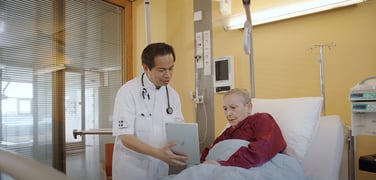What is Patient Engagement and Why is It Important in the NHS?
Patient engagement is crucial for successful healthcare delivery, enabling informed decision-making and improving the overall patient experience and outcomes.
4 minute read | 11/12/2018

What is Patient Engagement and Why is it Important?
How much healthcare a patient needs directly impacts the engagement strategy that the NHS will opt for. All engagement strategies are suited towards varying situations, so there’ll be one that’s most effective for you. An assessment will be carried out of both existing health conditions and goals before a preferred strategy is decided.
Engagement for a high-risk patient is achieved through care management. This model operates on the basis of sharing data between the patient, family members and a care coordinator too. The SPARK Media Fusion platform allows healthcare professionals to tap into the system with an access card to bring up the relevant information. This allows them to see the information through a digital window and they can then easily run through it with the patient and their loved ones.
Patient engagement doesn’t just stop at clinical access, it also ties in everything from information, surveys, educative videos, TV and radio too. These things play a crucial role within the NHS and all work together to improve the time that patients spend in hospital. Happier patients mean that hospitals can work more efficiently and also reduced recovery times.
Patient engagement allows them to take control of their own healthcare journey. With the information provided in pamphlets, leaflets and diagnosis tutorials, patients can spend more time making sense of what the doctors have previously said to them. Often, patients are confused and aren’t sure exactly what the extent of their injuries and illnesses are. Patient engagement allows more understanding time and an improved service from the NHS.
What is the Current State of Patient Entertainment?
Trusts are looking to provide a patient-centric experience but due to the legacy Patient Entertainment Systems (PES) that are widely used throughout the NHS, this isn’t possible. A fully managed media solution which enhances patient engagement and allows NHS staff to focus their time on delivering expert medical care, is required to achieve this.
The PES that is implemented and currently used in NHS Trusts are the Hospedia Bedside Units. What they can offer are limited due to the age of the technology. Did you know they are over 20 years old! The fact they are still running today is pretty impressive. They also still run on the patient pays model, which SPARK TSL have a vision to remove after our acquisition of Hospedia in 2021.
While surveys are a feature on the current Bedside Units, the access to them is limited, as well as the types of responses that can be given. Feedback surveys are vital as they allow patients to have their say on the way that the NHS is shaped and operates. It helps the NHS figure out what they can do to improve the level of treatment and service in the future.
How Can it Be Improved?
A new system that is powered by advanced WiFi connectivity would provide patients with their entertainment and engagement needs, all in one place. If patients can then enjoy these perks on the device of their choice, it would allow them a sense of freedom and personality. Trusts are also offered the option of purchasing mobile tablets and other devices to provide patients who don’t have their own the chance to still enjoy the perks of SPARK media Fusion during their time in hospital.
You can often lose track of time when in hospital, so a constant stream of the latest ongoings in the world is a good way of keeping them informed and still in the loop of the outside world. Providing patients with access to user-friendly tools and access to informative content like the latest news would help to minimise this issue, while simultaneously boosting the patient experience.
Another way in which the NHS can provide a more patient-centric experience is by allowing access to educational videos and further information on healthcare. They’re great ways for patients to stay in the know about their injuries and issues by helping patients to understand the exact severity of their problems and what they can expect in terms of treatment.
The patient can be presented with their personal information on a Trust Owned device if the clinician shows it to them, but the clinician will then revoke access to this when they walk away. However, the patient can be given educative information on their condition and managing their treatment via access to the NHS choices website to ensure that they are getting valid information from credible source.
Hospital WiFi and the Right Patient Entertainment System Can Benefit the NHS... Here’s Where to Read More
Advanced WiFi technology holds the key to creating this patient-centric media experience, whilst providing Trusts with valuable patient insight and the potential to make cost-saving developments.
During their time in hospital, patients can lose a sense of independence as they can find themselves requiring the assistance of doctors and nurses constantly. This can be frustrating. They want independence and a strong patient-centric system can provide them with this. It will also allow them to communicate with the medical staff more efficiently too.
Not only this, but they’ll be able to access entertainment and hospital services and have a say in how their hospital experience is run. Nobody wants to be in hospital in the first place, so the last thing they’ll want is to be bored too. If patients feel like they’re in charge of their own healthcare journey and trusts continue to improve on the back of surveys, the NHS will be in a better position all around.
To find out more on the benefits of implementing a sophisticated hospital WiFi and patient entertainment system, download our product brochure below.
About the author
Rebecca O'Donovan
Becky is the Marketing Director at SPARK TSL, of whom she has worked for since 2012. She is responsible for high-level marketing strategy focusing on lead generation and aiding the vision of the business to ensure business growth.
More articles by the author
Related articles
 Healthcare Industry
Healthcare Industry
Delivering Patient-Centred Care With the Technology | SPARK TSL
At its core, healthcare is about the patients — technology is simply an enabler. There’s so much more to ...
 Company News
Company News
Introducing SPARK Fusion®, the Hospedia Upgrade
Understanding Hospedia, the current bedside entertainment solution If you’ve been to hospital, then you’ve ...
 Company News
Company News
Boost Patient Morale by Providing Free TV Access for the Euros
The importance of keeping patients connected to the outside world It’s easy for patients to feel isolated in ...


